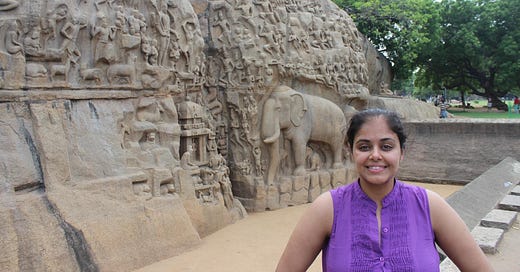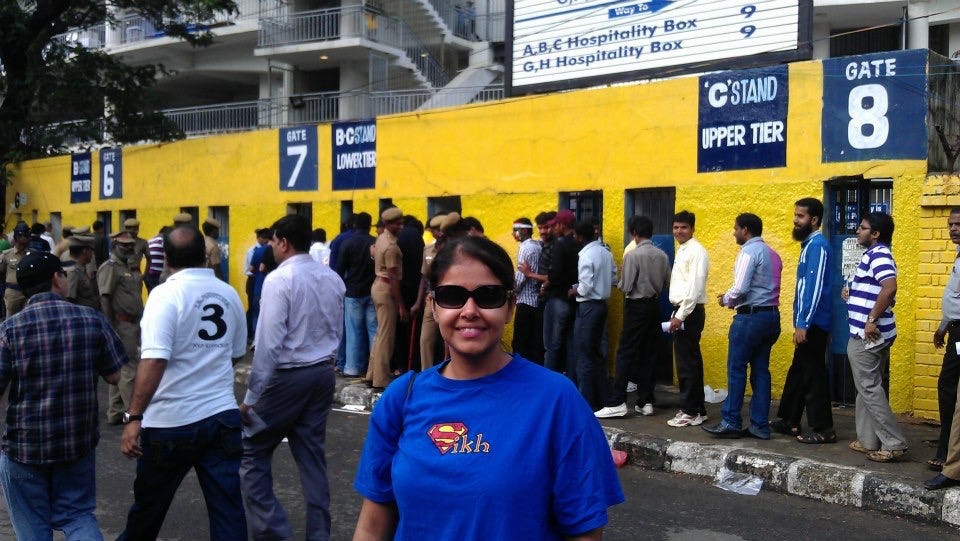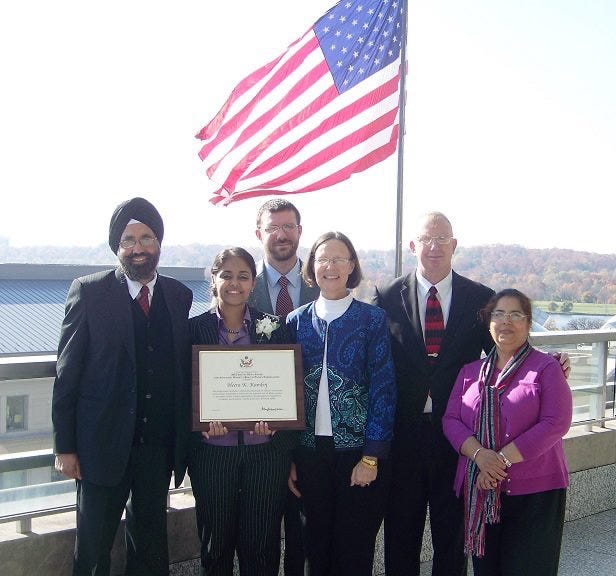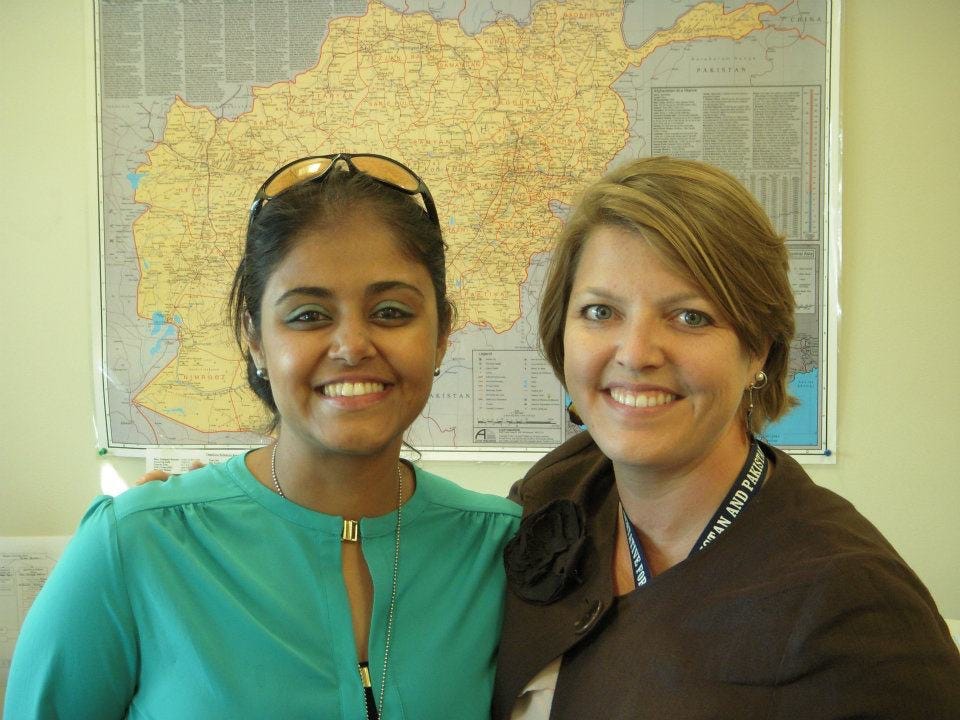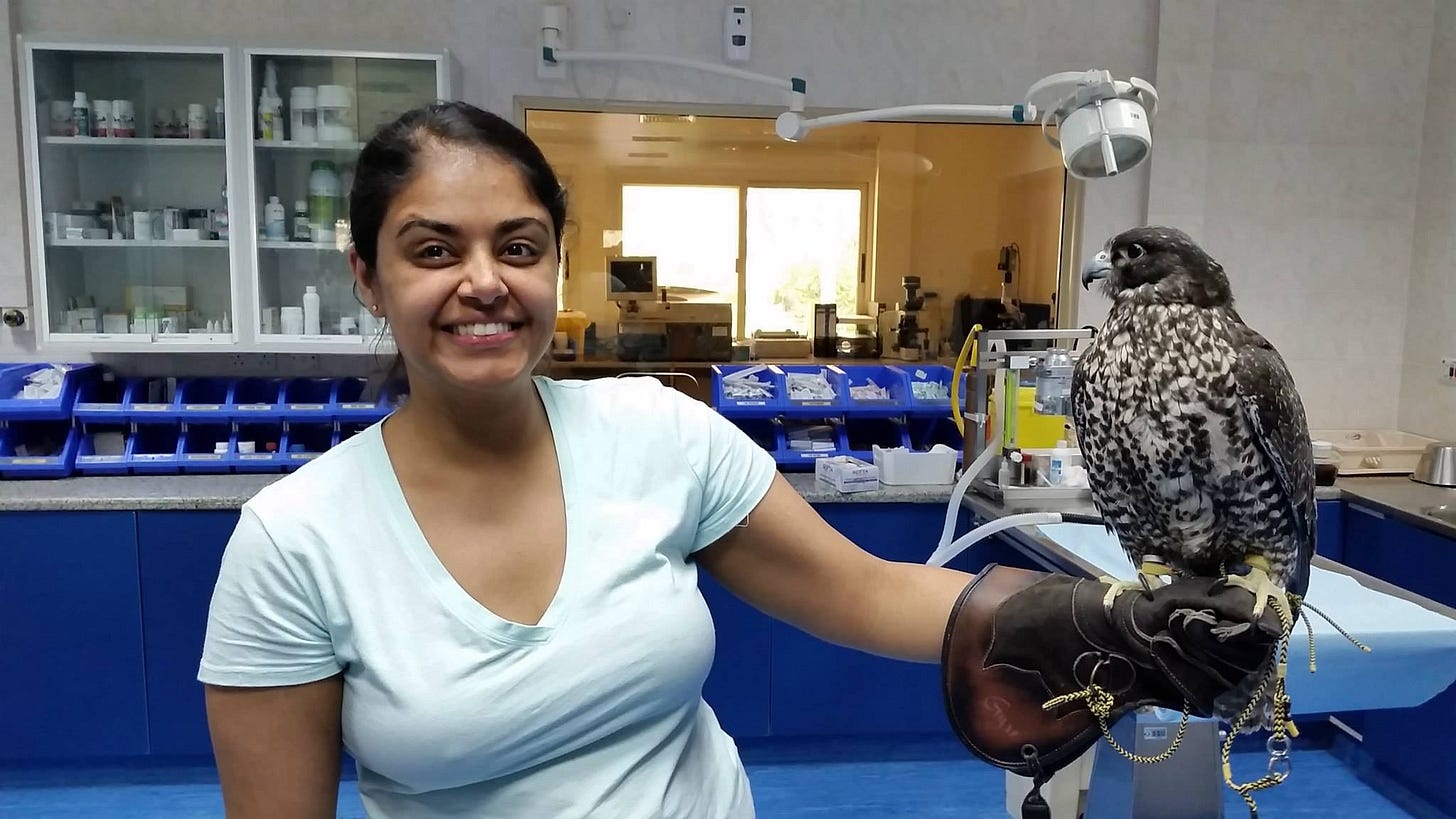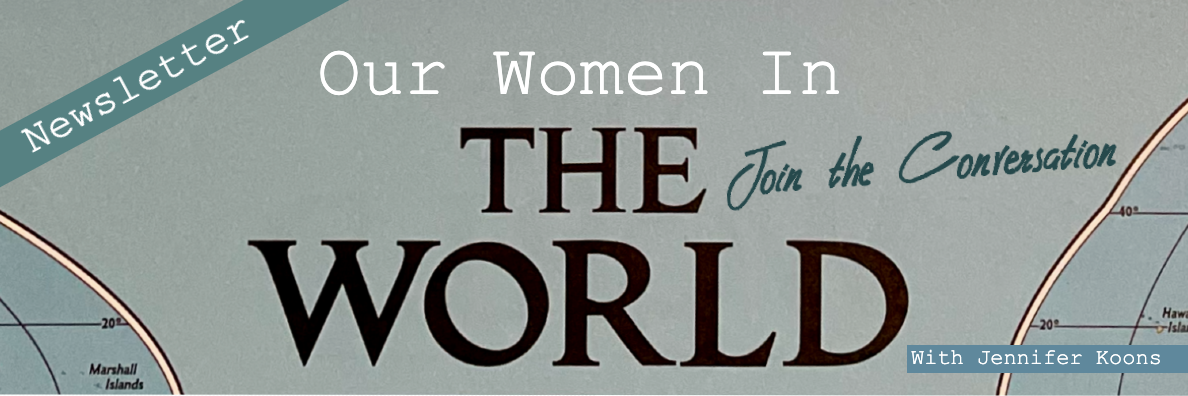In Conversation: Heera Kamboj
'I am banking on our ingenuity and work ethic to get us through.'
To seek out the unknown and to be energized by the unfamiliar, these are the pros, the given. So it’s almost unexpected — though no less true — to hear Heera Kamboj reflect on the beauty in the mundane routines, which inevitably emerge wherever we live and work.
What do I mean by this? Basically, when you live somewhere else, it becomes your home and you end up going to work, worrying about grocery shopping, kids’ school activities, weekend errands — but all in this new place that is not your home country.
A career Foreign Service Officer, Heera will next serve as a Special Assistant in the Office of the Undersecretary of State for Public Diplomacy starting in August. The conversation below spans from Heera’s earliest desires to lead a life of service to how that same topic shows up in the classroom where she recently finished teaching a course on disinformation and diplomacy.
Please enjoy getting to know Heera.
When and how did you know you would be at home in the world?
I always knew I wanted to serve our country. I had a dad growing up always saying the United States was the greatest country on Earth, and my maternal grandfather also fell in love with the United States. The question was how to serve — I thought about the U.S. military. I told a middle school social studies teacher about my desire to serve, and to use my love of languages — she immediately thought of the U.S. Foreign Service. And I thought — foreign legion? What?
I did not really “know” that I would be at home in the world until my second tour in Kabul. I was sitting in a meeting with these Afghan men in an old fort from circa 300 BC. I was the only woman in the room.
I had this out of body experience where I am looking at myself in this meeting and thinking, “this is so cool!” And I think the bug bit me, and I have been lucky to have a few of those moments in all of my assignments overseas.
Was there a book, TV show or other character that you related to as a kid or teenager and which, looking back, hinted at the career path that lay before you?
Not really. My parents wanted me to be a doctor, so the thought of serving overseas never really hit me until high school. In middle school, I realized how limited the representation of Sikhs was in the media. I wanted to change that. So I shifted my parents’ dream and started to talk about becoming a medical journalist or correspondent covering the medical beat.
By high school, my dad would bring home the New York Times from his commute everyday and we would talk about international affairs. I also became enamored with foreign correspondents, especially female ones.
Do you remember the scent, smell, sounds or other visceral impressions from your first posting?
Yum. Just yum. Mexico City is a food paradise. I was so oblivious to the diversity of the food from Central and Southern Mexico — and was shocked by the complex spices and flavors. And Mexico City is one of the cleanest places I have ever lived — shopkeepers mop and clean up their sidewalks everyday, so I remember the sanitary smell on my commute to work everyday.
I remember being shocked by the vibrancy of colors — flowers, clothes, and art. It was like entering a technicolor world whenever you stepped outside of the office.
Every post has had this “snapshot” experience in my mind — where it leaves this palpable taste, essence, and image in my brain.
What would most surprise someone on the outside about your favorite part of living and working abroad?
The mundaneness of life. How everything becomes routine, and there is beauty in that. What do I mean by this? Basically, when you live somewhere else, it becomes your home and you end up going to work, worrying about grocery shopping, kids’ school activities, weekend errands — but all in this new place that is not your home country.
And it is bittersweet because you realize you now “live” there, and are of that place. So that original sheen wears off, but you also feel more comfortable and settled. You of course have unique experiences everyday, but those are squeezed into the day-to-day and when you see a Tamil dad grabbing a quick lunch or an Emirati mom taking her kids out —there is this common kinship.
Was there a private struggle that you think, reflecting back upon now, might be a comfort or prove instructive for those just beginning their careers?
Instead of being trapped by “grass is greener,” “grow where you are planted.” My dream jobs did not turn out to be all that great, but the jobs I was wary about were my favorite assignments thus far. I give this advice to everyone who asks me, as do other Foreign Service Officers, but it is true.
I think with experience, I realize that the people you work with are the most important part of that formula. You spend 8, 10, or 12+ days with some people, more than your own family — so you have to like each other and have a common mission. It really builds solidarity. That’s why Kabul was my favorite tour. And the other end of it is — you are never stuck or trapped. You can do anything for a year, but these are real years of your life so don’t get stuck in the trap of being...stuck.
Give me the most memorable "Homeland" and then "Madam Secretary" moments from your career at State.
I have never seen either show! So I took a guess...
Homeland: There was an attack when I served in Kabul in 2011. It is slow motion and scary. You are very thankful to be alive. Then you get up and go into the office and work with your colleagues to try and do your darnedest.
Madam Secretary: I remember sitting at this UN Women Working Group meeting in Kabul, where it was my turn to chair the group. I remember being intimidated by the other diplomats, and civil society representatives, but we were all there to improve women’s rights and empowerment and once you focus on that — it was easier to talk and get through the agenda despite my nerves.
In domestic politics, it's common for politicians in both parties to denounce the foreign aid budget or specific engagement with countries like Iran or China. How can the State Department and those like you — who have seen the inside and outside of the foreign policy apparatus — make diplomacy relevant to so-called "average" Americans so that these policy decisions seem less opaque?
I really like the concept of bringing diplomacy “back” to the United States that has been championed over the past decade.
Citizen diplomacy has always existed, where cities and towns in various parts of the country host exchange students and program participants. Sister city programs. Business leaders and local chambers of commerce also are strong advocates and emissaries for citizen diplomacy. Still, those are only a drop in the bucket.
The State Department also is doing more through its “Hometown Diplomats” program where we go back and try to explain our careers, and inspire students to pursue careers in foreign policy and international affairs. I think my econ officer colleagues, Foreign Commercial Service Officers, and Foreign Agriculture Service Officers really hone in on what matters — the wallet.
They work hard everyday to ensure opportunities and markets for U.S. goods and services. Our spokesperson’s office tries to explain U.S. foreign policy everyday to my fellow Americans.
Your question is essentially a question about diversity — how do we make sure there is geographic, socioeconomic, and political diversity in the people we reach out to through the aforementioned initiatives. As the Foreign Service pulls people from more and more representative backgrounds, I am confident that the connection will become clearer for all.
What are some ways in which you think the department can address persistent and pervasive gaps in hiring and promoting non-white employees, particular women. It's a problem that did not originate during the Trump administration though it was certainly exacerbated. What are tangible and out-side-the-box ways to make significant and sustained changes?
I have read every single report that has come out in the last year, all of which include worthwhile recommendations and ideas. I am a proud Pickering Fellow, which was created to recruit individuals of diverse ethnic, racial, socio-economic, and geographic backgrounds among others. That program, alongside the Rangel Fellowship (and USAID’s Payne Fellowship), has done a great job on recruitment.
What you will see in most of the reports is the issue of retention.Female and minority officers want the same thing everyone else wants: impact, recognition, and growth. They also want to be appreciated and make sure their spouses are gainfully employed. This is of course my opinion, but giving officers’ greater recognition and growth through increased opportunities (training, high-profile supervisory positions, promotions) wouldremedy a lot of issues.
If there is a statistical disparity in any of these areas, added on to the unique stresses of relocating your family and spousal employment — it really hurts retention. But the Department has grown a lot since I joined and the pandemic also sped up workplace flexibility. I am looking forward to seeing what the new Chief Diversity and Inclusion Officer is able to accomplish, and I know we all need to do our best to help her achieve and implement her recommendations.
And I also need to plug the International Career Advancement Program where I sit on the Fellowship Association Board. ICAP does a great job of supporting mid-career officers from diverse backgrounds to fall back in love with their careers and to figure out ways to excel and succeed.
I also enjoyed co-hosting the Diverse Diplomacy series at Georgetown this past year where we were able to feature Ambassadors and mid-career officers of diverse backgrounds and experiences. The series helps by recruiting future FSOs, but also showcases some of the exceptional officers we already have and to elevate them.
A new administration came to power, and in the first six months, there’s been a lot of talk about a diplomatic "re-set." With the Jan. 6 attack on the U.S. Capitol building, America's internal struggles have never been more front and center to the rest of the world. What can individual diplomats do at this time to engage with their counterparts when so-called "American exceptionalism" appears especially tenuous? What instincts should they call upon? What historical references, books or leaders can they look toward for guidance?
What makes America exceptional is not just that it is a democracy, or the ingenuity, optimism, and work ethic of its citizens. In addition, to all of those, it is the ability to reflect and to try and improve.
It was the great experiment of our Founding Fathers...and it worked! It was all about forming a “more perfect union” and we have had to improve and increase access to that democratic dream to all of our citizens for nearly two and a half centuries.
And as a Foreign Service Officer, we aim to expand that access to good governance, economic opportunity, and stability and security to others as well. From introspection and reflection, comes growth and renewal.
So I think it boils down to being humble, and saying that we do not get everything right, but we constantly strive to do so. We express our sincerity, and aim to bring others along with us for that vision of aspiring for “more perfect” each day. Not the false promises and lack of vision or hope and apathy espoused by authoritarians.
Finally, can you share what is keeping you up at night and what is what is giving you hope?
I just wrapped up a semester teaching a course on disinformation and diplomacy with Georgetown University’s Institute for the Study of Diplomacy as a Rusk Fellow. When we defined the problem and discussed the recent history of disinformation both at home and abroad — it was terrifying. As one of my students described it: an existential crisis.
I think what is scary is that the solution is daunting — it requires not only a whole of government approach to countering disinformation, but also a whole of society approach. It will take state and local governments, teachers and libraries, businesses, tech companies, and others all working together — not to mention everything the Federal Government is trying to do alongside our multilateral allies.
What leaves me hopeful is that each and everyone of those students I taught wants to do something about it. Some of them want to go into international law, others want to work on legislation at the Hill, others at the FBI, a few in the private sector or at tech companies, and a few even want to join the Foreign Service (despite having me as their professor).
We all make a decision about whether to serve domestically and overseas — it is pretty clear now that these are no longer divorced. I am banking on our ingenuity and work ethic to get us through.
Know a Woman in Foreign Policy Who Should Join our Conversation?
Share in the comments below or email me at jennifer.koons@protonmail.com.


